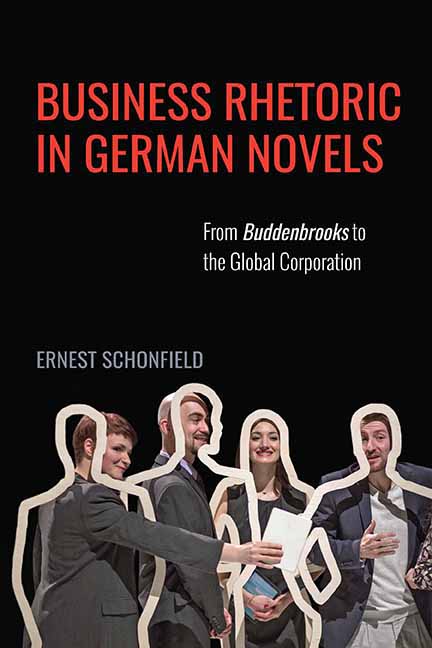Book contents
- Frontmatter
- Dedication
- Contents
- Acknowledgments
- List of Abbreviations
- Introduction
- 1 Managing Appearances in Thomas Mann's Buddenbrooks, 1901
- 2 Oratory and Publicity in Heinrich Mann's Der Untertan, 1914/18
- 3 Organizing Speech in Gabriele Tergit's Käsebier erobert den Kurfürstendamm, 1931
- 4 Seeing through the Rhetoric in Bertolt Brecht's Dreigroschenroman, 1934
- 5 Giving an Account of the Self in Ingeborg Bachmann's Malina, 1971
- 6 Negotiating Bureaucracy in Hermann Kant's Das Impressum, 1972
- 7 Corporate Discourse in Friedrich Christian Delius's Unsere Siemens-Welt, 1972
- 8 Producing Ethos in Kathrin Röggla's wir schlafen nicht, 2004
- 9 Communicative Contests in Philipp Schönthaler's Das Schiff das singend zieht auf seiner Bahn, 2013
- Conclusion
- Notes
- Bibliography
- Index
1 - Managing Appearances in Thomas Mann's Buddenbrooks, 1901
Published online by Cambridge University Press: 15 August 2018
- Frontmatter
- Dedication
- Contents
- Acknowledgments
- List of Abbreviations
- Introduction
- 1 Managing Appearances in Thomas Mann's Buddenbrooks, 1901
- 2 Oratory and Publicity in Heinrich Mann's Der Untertan, 1914/18
- 3 Organizing Speech in Gabriele Tergit's Käsebier erobert den Kurfürstendamm, 1931
- 4 Seeing through the Rhetoric in Bertolt Brecht's Dreigroschenroman, 1934
- 5 Giving an Account of the Self in Ingeborg Bachmann's Malina, 1971
- 6 Negotiating Bureaucracy in Hermann Kant's Das Impressum, 1972
- 7 Corporate Discourse in Friedrich Christian Delius's Unsere Siemens-Welt, 1972
- 8 Producing Ethos in Kathrin Röggla's wir schlafen nicht, 2004
- 9 Communicative Contests in Philipp Schönthaler's Das Schiff das singend zieht auf seiner Bahn, 2013
- Conclusion
- Notes
- Bibliography
- Index
Summary
er … ließ seine Künste spielen und machte ein unglaubliches Geld
[he … put all his arts to work, and made an incredible profit]
—Thomas Mann, BuddenbrooksIntroduction: The Art of Doing Business
MOST SCHOLARSHIP ON Buddenbrooks has tended to focus on the theme of decline and on what the Germans call Innerlichkeit: the interiority or inner life of the characters. Sometimes the characters’ inwardness is interpreted in terms of economic change: Anna Kinder and Michael Cowan argue that the nervousness of the Buddenbrooks increases in direct response to the economic uncertainty of capitalist modernity. Unfortunately, this tendency to focus on the characters’ “interiority,” even when it is connected to the wider economic framework, distracts attention from the actual business practices depicted in the novel. It also runs the risk of ignoring something the characters themselves take very seriously: external appearances (Äußerlichkeiten). If Thomas Mann (1875–1955) learned one thing from Theodor Fontane, it is that only by paying close attention to so-called casual appearances is it possible to gain an understanding of society. Few scholars have seriously considered appearances and externalities in Buddenbrooks. Notable exceptions are Martin Swales, who observes the portrayal of a family that consciously works very hard to sustain its public role, and Elizabeth Boa, who considers the ways in which the Buddenbrooks seek to regulate sensual pleasure. Reading Buddenbrooks, we find that appearances, far from being casual, are careful constructs to which the family members themselves attach huge importance. Many valuable studies of Buddenbrooks that investigate the character and ethos of the family in terms of a sociohistorical perspective miss the point, noted in the introduction to this book, that classical authors consider ethos to be a performative construct. Referring to classical oratory helps us to comprehend the Buddenbrooks as actors in both senses of the word: as participants in economic (and political) processes, and as theatri cal performers. In this sense, the Bürger (citizen) is also, simultaneously, a performing Künstler (artist). There is a constant social performance that is required of the Buddenbrooks precisely because of their social position. Social convention means that they are always both citizens and artists, in the sense of the daily social performance they must enact.
- Type
- Chapter
- Information
- Business Rhetoric in German NovelsFrom Buddenbrooks to the Global Corporation, pp. 20 - 39Publisher: Boydell & BrewerPrint publication year: 2018

